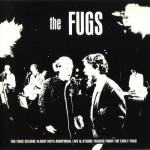Recent threads on The Fugs have brought to mind my early encounter with their music, and the band itself, during my first visit to the St. Mark’s Church-in-the-Bowery, November 1965. When asked for a short statement on the Poetry Project for Anne Waldman’s anthology Out of This World: An Anthology of the St. Mark’s Poetry Project, 1966–91, I wrote:
Thinking back on the Poetry Project, I am reminded of an absurdist question posed by Gerard Malanga to Charles Olson in The Paris Review: “A school is place where one can learn something. Can a school lose by giving away its knowledge?” From my first involvement with it in about 1972, The Poetry Project seemed a place where a school of poetry—the New York School—was physically embodied in a group of writers who felt free to develop in the confidence of their mutual (and contending) assumptions, and I certainly learned something from that. Its “effect on my writing career” came directly from the social confidence of that school, its urban directness and aesthetic autonomy, which I consider to be unique in American literature. Yet at the same time its literary moment seemed fragile, and in “giving away its knowledge” it did not seem able to reconstitute itself as an unambiguous cultural fact as the seventies turned into the eighties. Perhaps it could have been otherwise; rather than a romance of beginnings that turned into a looking backward to sources in the Beats—as, say, Ted Berrigan’s interpretation of his work veered from the terrorist implications of cut-up to the recuperative ones of autobiography—there might have been more of an opening, for instance, to issues in other arts and modes of thought, to a wider intellectual life. This may be more of a problem for poetry in general than for the Poetry Project, so I would say that the question of a school changing as it gives itself up in the course of its development (and I can think of other schools) has led me to a desire for a literature less insular in its relation to everything else! But for an anecdote, how about this: the first thing I did when I got to the East Coast, as a student at MIT in 1965, was to go straight to the Church, where Lee Crabtree offered me a swig of the crême de menthe he was drinking while playing piano for the Fugs, and I’m sure that changed my life. (684)
This cheeky recollection of the New York School is darkened by Lee Crabtree’s suicide, even the date of which is not immediately available. Let this note be a monument to Lee, whose gesture had such foresight. Such would be my preferred form of necrology, I might add—to work with the traces of those who have passed on as what remains.













